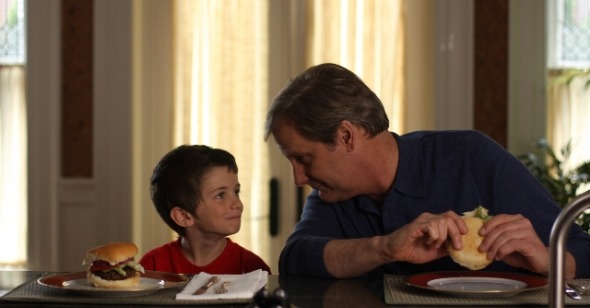Dear God
By Justin Stewart
The Answer Man
Dir. John Hindman, U.S., Magnolia Pictures
In the early Nineties, writer Neale Donald Walsch was living in a tent and surviving on recycled can money. He had a broken neck, a broken marriage, and a burnt-down house. Then he turned to God, and found Him surprisingly chatty. His one-on-One “inspirations” congealed into the smash hit Conversations with God, which summed up man's place on Earth with some pat truisms and advice on how to live with spiritual contentment. The book went on to spawn innumerable imitations and its own cottage industry; there was even a skepticism-free 2006 Walsch biopic.
The Answer Man is not that movie, nor does it even directly allude to the real Walsch. But for awhile its aim seems to be to take the piss out of (if nothing so violent as blow the lid off of) his type of new-age phenomena, which centers around the discoveries of one “enlightened” seer. Here, Jeff Daniels plays Arlen Faber, whose very Walschian Me & God, a book that also purported direct convos with the Maker, was a massive success 20 years before the movie begins and still sells enough to keep his upper-class existence in Philadelphia secure. The bug in the ice cream is that Faber is miserable—cranky, constipated, sore, bloated, and profanely irritated. When we first see him he's painfully attempting some contortions and cursing over his failure to “unlock the heaven within.” “This is the great guru?!” we're meant to gasp as we prepare for a cynical, skewed take on the hypocritical self-righteousness of the self-help world.
But novice writer-director John Hindman isn't a lampoonist, which is not a fault (a skewed take on the self-help world would be redundant and awful anyway). His Faber, like Jack Nicholson's Melvin in the movie’s obvious template, As Good as It Gets, exists as a curmudgeon in the beginning only so he can be redeemed later by the love of a single mom and an empathetic relationship with a troubled friend. Faber is forced into these uncomfortable motions when his back gives out, leaving him immobile on his floor while “Isn't It Romantic?” skips on the turntable (“Isn't it… Isn't it… Isn't it…”). Unable to reach help with his voice-activated phone, he slithers and shimmies outside and down the street to Lauren Graham’s chiropractor Elizabeth, who snaps him back into place. His gratefulness turns to romantic interest, which she reciprocates when she reads his book and is moved (“Some of the best answers I've ever heard," she rhapsodizes).
Faber's troubled friend is indie bookshop owner Kris, played by the thumbsucker himself, Lou Taylor Pucci. Business is bad at Kris's shop, and he's hot out of rehab for an alcohol addiction he picked up from his father, who resumed hitting the bottle and thus requires the care of his weary son. Clearly desperate for some guidance, Kris seeks out Arlen, who has a habit of trying to sell off (often in costume) some of his bounteous copies of Me & God to the shop. With his flannels, earring, and facial scruff, Pucci (who fit well into the enjoyably soulless world of The Informers) seems like he'd be too cool to concern himself with new-age piffle, even with his direct access to the author, but the relationship he forges leads predictably to healing for both.
In fact, everything leads predictably to its predictable destination—not a capital offense in itself, but the journey is more irritating and unpleasant than it needs to be. Daniels does what he can with his character's surly-sweet seesaw, but Arlen Faber is never enjoyably mean like Bogart in The African Queen (Nicholson's gassy rants in As Good As it Gets had occasional bite, even though the best were all spoiled by the previews). Daniels here recycles his Squid and the Whale pestilence, but Hindman’s a less incisive writer than Noah Baumbach. The most lasting impression I have of Daniels is a shot from below of his epic jowls, red and jiggling, as Graham does her business to him on the healing table.
The movie's attempts at levity are airless: Elizabeth’s assistant (Olivia Thirlby) in a puffy spinal-cord costume falling down as she tries to bring in business outside; Faber going by the alter-ego Zebulon at a parent-teacher meeting; continued references to "Isn’t It Romantic?" Small character touches like Faber's fondness for the “monster movies” he used to watch with his dad feel desperate. When he admits that he never literally spoke to God, Elizabeth is SHOCKED (“You lied!”), an absurd reaction by a character meant to be intelligent. The movie's genuine Christian sentiments are poorly hidden, even though Faber's profanity might make them feel snuck in. “Every day He falls in love with you,” is the final spoken message: why need it take a string of storytelling contrivances to get there?
